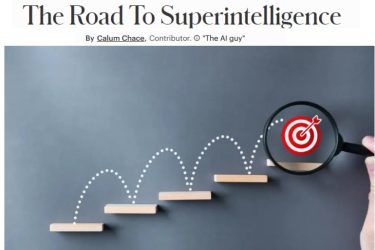Economists can be surprisingly dangerous
Most economists are convinced that automation will not lead to lasting unemployment. They point out – rightly – that it has not happened in the past. Instead, it has made products and services cheaper, which raises demand and creates new jobs. They say that the Luddites, who went round smashing weaving machines in the early nineteenth century, simply mis-understood what was happening, and this mis-understanding has become known as the Luddite Fallacy.
 But in the coming decades, automation may have a very different effect. Past rounds of automation replaced human and animal muscle power. That was fine for the humans who were displaced, as they could go on to do jobs which were often more interesting and less dangerous, using their cognitive faculties instead of their muscle power.
But in the coming decades, automation may have a very different effect. Past rounds of automation replaced human and animal muscle power. That was fine for the humans who were displaced, as they could go on to do jobs which were often more interesting and less dangerous, using their cognitive faculties instead of their muscle power.
It didn’t work out so well for the horse, which only had muscle power to offer. In 1900 there were around 25 million working horses on farms in America; now there are none. 1900 was “peak horse” in the American workplace. Are we heading towards “peak human” in the workplace?
Intelligent machines are replicating and in many cases improving on our cognitive abilities. What most of us do at work these days is to ingest information, process it, and pass it on to someone else. Intelligent machines are getting better at all of this than us. They are already better than us at image recognition; they are overtaking us in speech recognition, and they are catching up in natural language processing. Unlike us, they are improving fast: thanks to Moore’s Law (which is morphing, not dying) they get twice as good every eighteen months or so.
Self-driving cars are the obvious example: there are news stories every day about the plans of the tech giants and the big car makers, and Uber is running a live experiment with self-driving taxis in Pittsburgh.
Self-driving cars are just the start. The early stages of automation by intelligent machines are apparent in the legal, medical and journalist professions, and it is clear that it will affect every industry and every type of work. Retired British politicians like William Hague and Kenneth Baker (former foreign secretary and education secretary respectively) have begun to speak out about this, perhaps because they have nothing to lose and can afford to say the un-sayable.
No-one knows for sure how automation by intelligent machines will pan out. Maybe we will evolve an economy of what Silicon Valley types call “radical abundance”, where machines do all the boring jobs and humans concentrate on having fun.
Or maybe a more dystopian outcome will happen instead, with millions starving while the super-rich cower behind high walls and powerful AI-based defence systems.
Technological unemployment is not impossible. It is complacent and irresponsible to say that it is, based on no evidence beyond what has happened in the past. We should be discussing it and working out how to handle it if it does happen. Failure to do so is the Reverse Luddite Fallacy*, and it could be extremely dangerous for all of us.
* Hat-tip to the merry men behind The Singularity Bros podcast who, as far as I know, minted this phrase


